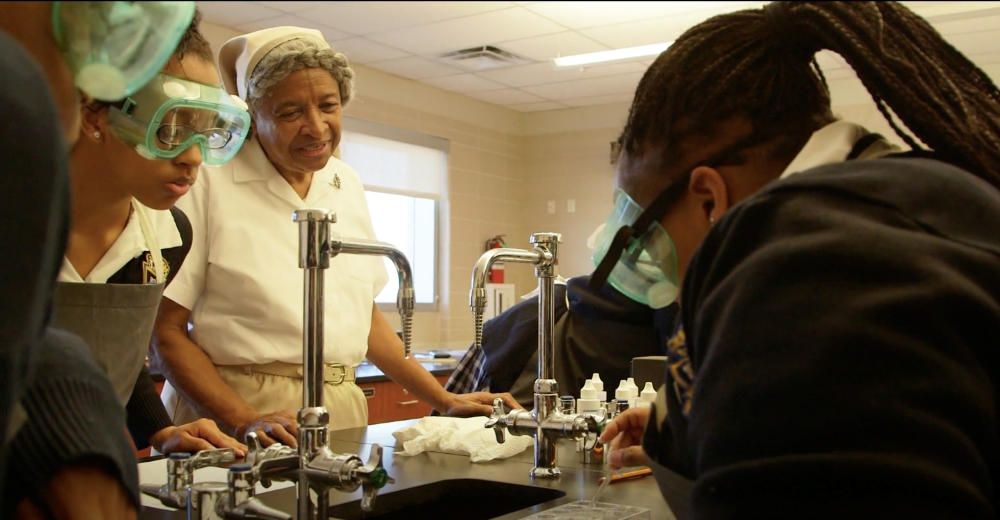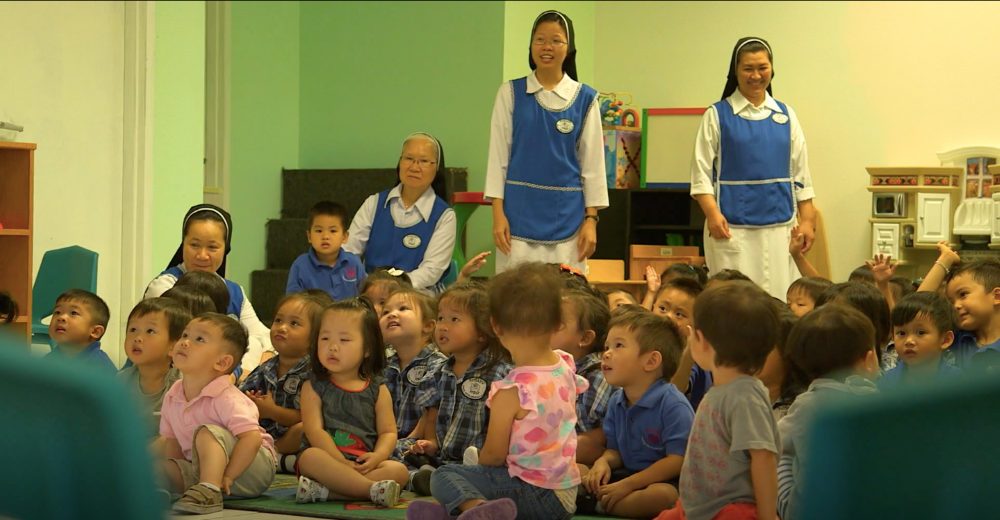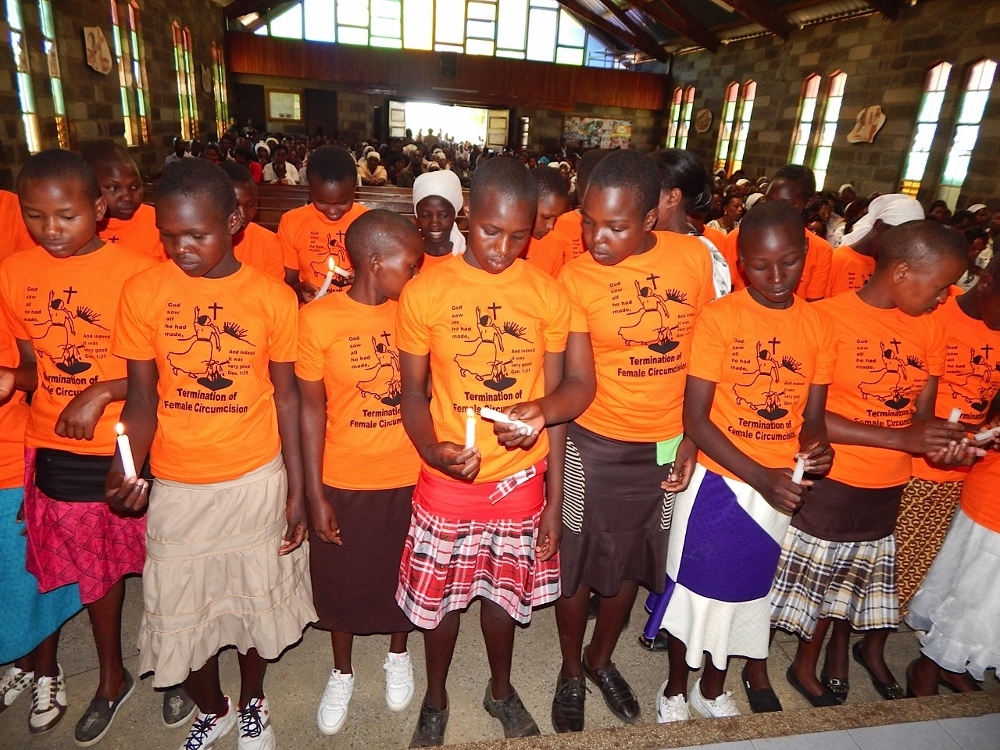
Holy Family Sr. Judith Therese Barial with students at St. Mary's Academy in New Orleans. Barial and her work stand to benefit from a new grant from the Conrad N. Hilton Foundation to the Loyola Institute for Ministry. (Courtesy of Loyola University)

The Conrad N. Hilton Foundation's Catholic Sister Initiative has awarded a three-year grant totaling $545,000 to Loyola University New Orleans' Institute for Ministry. The grant will provide "transformative support for the leadership and well-being of Catholic sisters in the greater New Orleans community and beyond," according to the press release.
The funds will go toward the project "Flourishing Sisterhood: Nourishing Communities in the Gulf South." The press release noted that conversations with local sisters initially inspired the effort, in which sisters will participate in theological and spiritual formation at the Loyola Institute for Ministry, which focuses on spirituality and aging. (The Conrad N. Hilton Foundation is the major funder of Global Sister Report.)

Daughters of Our Lady of the Holy Rosary of Chí Hòa at Rosary Child Development Center in New Orleans. The program is one that stands to benefit from a new grant from the Conrad N. Hilton Foundation to the Loyola Institute for Ministry. (Courtesy of Loyola University)
In partnership with Sr. Beth Fitzpatrick, a Sister of Mount Carmel and the vicar for religious for the Archdiocese of New Orleans, the institute will develop a plan in response to the needs of local sisters based on their responses to a survey.
The institute will also produce a podcast series devoted to the stories that sisters share regarding their experiences fighting for justice and the wisdom they have gained, with the hopes that the series will help generate support for their ministries.
"As we have learned from our previous work with religious sisters, they accomplish so much in support of the common good, often with limited resources," said Tracey Lamont, interim director for Loyola Institute for Ministry. "This grant is motivated by gratitude for the hard work of these amazing women, and will help them to thrive in their congregations and ministries."

Sr. Jean Dolores Schmidt attends her 100th birthday celebration at Loyola University on Aug. 21, 2019, in Chicago. (RNS/Emily McFarlan Miller)
Loyola University Chicago's chaplain — and the sister who stole the college basketball team's thunder at the NCAA Final Four in 2018 — recently turned 103.
Sr. Jean Dolores Schmidt, a member of the Dubuque, Iowa-based Sisters of the Charity of Blessed Virgin Mary, told the Associated Press her secret to longevity: "I eat well. I pray well — I hope I pray well — and I sleep well."
The Chicago train station plaza at the Loyola campus will be renamed in her honor.
Throughout the 2018 college basketball tournament, the media gave Schmidt a light celebrity treatment, as the sister was the subject of profiles, TV appearances, memes and merchandise (including bobbleheads).
"I saw it as part of my ministry, as part of my service," Schmidt told GSR in 2018 regarding her support of Loyola and the entertainment that ensued. "If I am talking on the radio and the people [listening] are uplifted by what I am saying, that's a kind of service. All this media is not going to my head. I'm just going with the flow."

More than 80 girls gathered in the village of Njoro, three hours northwest of Nairobi, for a week-long Christian Rite of Passage that is an alternative to FGM. (GSR photo / Atieno Otieno)
UN human rights experts: Female genital mutilation 'amounts to torture'
Human rights experts with the United Nations issued a statement Aug. 22 condemning female genital mutilation, calling the practice "a grave form of violence against women and girls that amounts to torture" and seeking stronger measures for its prevention and penalization in Sierra Leone.
The three special rapporteurs said this following criminal proceedings in Sierra Leone over the mutilation of a 21-year-old student that led to her death.
Female genital mutilation "violates the fundamental rights of its victims, including their physical integrity and rights not to be subjected to torture or other cruel treatment and to life, sexual and reproductive health," the experts said.
"Discriminatory customs are entrenched in social norms and configurations of power, tied to one's status and place in communities. Much like other harmful practices of similar nature, female genital mutilation reflects and perpetuates a broader trend of gender inequality."
The experts who issued the statement are Reem Alsalem, special rapporteur on violence against women and girls, its causes and consequences; Morris Tidball-Binz, special rapporteur on extrajudicial, summary or arbitrary executions; and Tlaleng Mofokeng, special rapporteur on the right of everyone to the enjoyment of the highest attainable standard of physical and mental health.
Female genital mutilation must be regarded as "gender-based violence, which simply cannot continue with impunity," as opposed to a practice that is normalized under sociocultural and religious customs, they wrote.
The "systemic failure" to protect women and girls impeded the criminal proceedings over the student's death, they wrote.
"The lack of a dedicated and enforceable legislation that expressly criminalises and punishes female genital mutilation is hindering judicial or other investigation into, and persecution of, these harmful practices and unlawful killings," the special rapporteurs said, calling for policies that provide accountability frameworks and disciplinary sanctions regarding this practice.
Advertisement
"Laws and policies need to provide clear accountability frameworks and disciplinary sanctions with respect to female genital mutilation," they said.
Addressing the Sierra Leone government specifically, the U.N. experts called for a comprehensive set of legal restrictions, including amending the Child Rights Act to prohibit such mutilation of girls younger than 18.
Earlier this year, Pope Francis also spoke on female genital mutilation, saying it "humiliates the dignity of women and gravely attacks their physical integrity."







